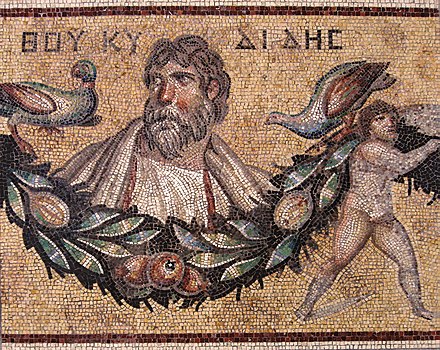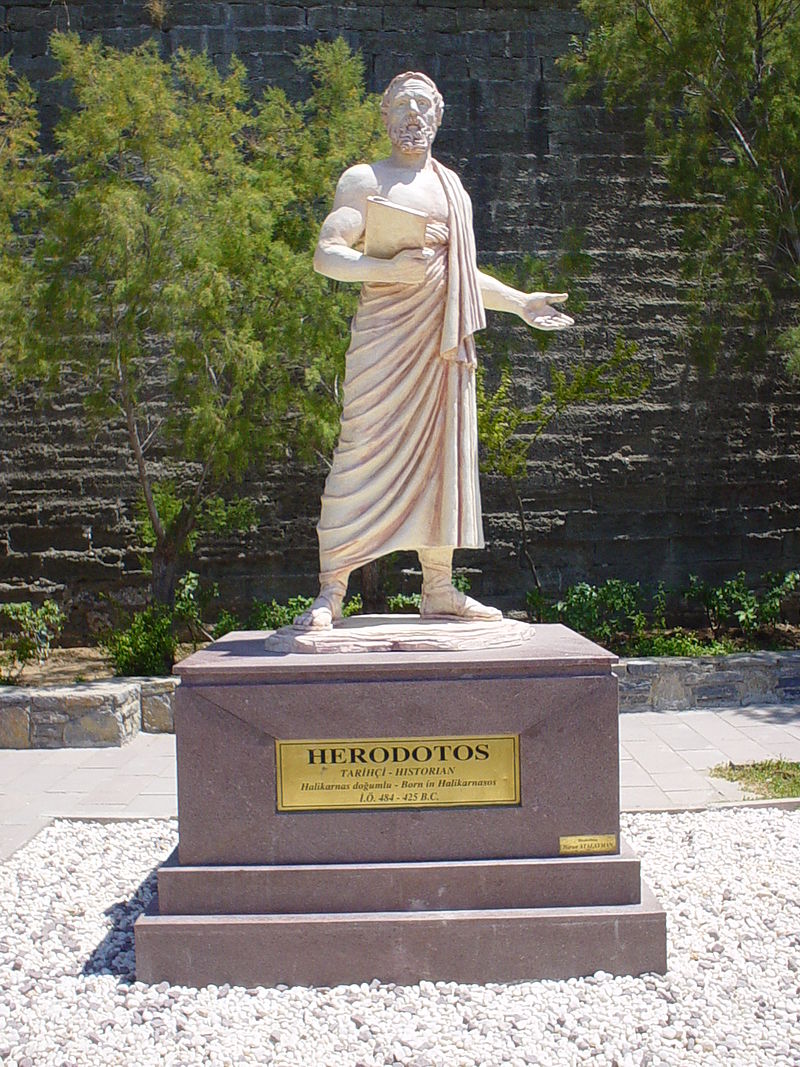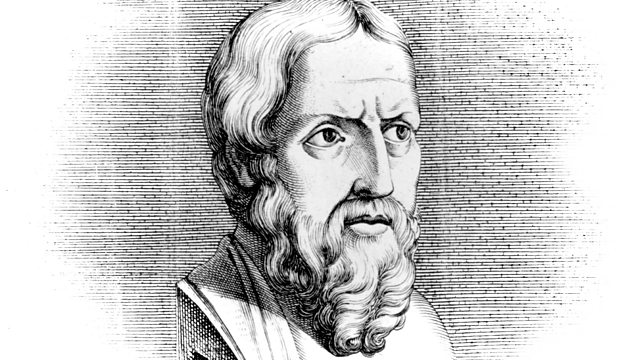Greek Historians
-
Ancient History Encyclopedia. (2009-2015). Herodotus. http://www.ancient.eu/herodotus/
 Detailed information about Herodotus (c. 484 – 425/413 BCE) was a writer who invented the field of study known today as `history’. He was called `The Father of History’ by the Roman writer and orator Cicero for his famous work The Histories but has also been called “The Father of Lies” by critics.
Detailed information about Herodotus (c. 484 – 425/413 BCE) was a writer who invented the field of study known today as `history’. He was called `The Father of History’ by the Roman writer and orator Cicero for his famous work The Histories but has also been called “The Father of Lies” by critics. -
Great Thinkers. (2015). Herodotus. http://thegreatthinkers.org/herodotus/biography/
 Herodotus of Halicarnassus was a fifth-century BCE Hellenic traveler and thinker, a student of human beings in all our variety. He is commonly referred to as “the father of history,” an appellation given him by the Roman orator and politician Cicero.
Herodotus of Halicarnassus was a fifth-century BCE Hellenic traveler and thinker, a student of human beings in all our variety. He is commonly referred to as “the father of history,” an appellation given him by the Roman orator and politician Cicero. -
Herodotus. (2021). https://www.britannica.com/biography/Herodotus-Greek-historian
 Article and 3 pictures describing his life and achievements
Article and 3 pictures describing his life and achievements -
Herodotus. (2021). https://en.wikipedia.org/wiki/Herodotus
 Good biographical information about Herodotus.
Good biographical information about Herodotus. -
Herodotus facts for kids. (2021). https://kids.kiddle.co/Herodotus
 Simple and brief outline of Herodotus with pictures
Simple and brief outline of Herodotus with pictures -
Kindt, Julia. (2016). Guide to the classics: The Histories, by Herodotus. The Conversation. https://theconversation.com/guide-to-the-classics-the-histories-by-herodotus-53748A high level article about Herodotus and his works.
-
History.com (2015). Thucydides. http://www.history.com/topics/ancient-history/thucydides
 One of the greatest ancient historians, Thucydides (c.460 B.C.–c.400 B.C.) chronicled nearly 30 years of war and tension between Athens and Sparta. His “History of the Peloponnesian War” set a standard for scope, concision and accuracy that makes it a defining text of the historical genre. Unlike his near-contemporary Herodotus (author of the other great ancient Greek history), Thucydides’ topic was his own time. He relied on the testimony of eyewitnesses and his own experiences as a general during the war. Though specific in detail, the questions he addressed were timeless: What makes nations go to war? How can politics elevate or poison a society? What is the measure of a great leader or a great democracy?
One of the greatest ancient historians, Thucydides (c.460 B.C.–c.400 B.C.) chronicled nearly 30 years of war and tension between Athens and Sparta. His “History of the Peloponnesian War” set a standard for scope, concision and accuracy that makes it a defining text of the historical genre. Unlike his near-contemporary Herodotus (author of the other great ancient Greek history), Thucydides’ topic was his own time. He relied on the testimony of eyewitnesses and his own experiences as a general during the war. Though specific in detail, the questions he addressed were timeless: What makes nations go to war? How can politics elevate or poison a society? What is the measure of a great leader or a great democracy? -
Ancient History Encyclopedia. (2009-2015). Thucydides. http://www.ancient.eu/Thucydides/
 Thucydides (c. 460/455 - 399/398 BCE) was an Athenian general who wrote the contemporary History of the Peloponnesian War between Athens and Sparta, which lasted from 431 BCE to 404 BCE. However, Thucydides' History was never finished, and as such, ends mid-sentence in the winter of 411 BCE. The History was divided into 13 separate books by later scholars, but is now, in its modern form, divided into eight books. Thucydides is quite often seen as the first historian to use 'modern' ideals with regards to his methodologies and ideologies, including the way that he uses eye witnesses as sources and cross-examines them, and the way that he uses speeches (a much-debated issue because of the problem of interpreting what Thucydides means when he describes how he goes about writing them, such as in (1.21) where it is not clear whether the speeches he quotes can be trusted as accurate accounts of what was said, or if they have been slightly fabricated by Thucydides to help with his themes). His work is meant as a “possession for all time” (1.22), rather than a piece designed to please the public (one of Thucydides’ many possible jabs at Herodotus and the other prose chroniclers of the day).
Thucydides (c. 460/455 - 399/398 BCE) was an Athenian general who wrote the contemporary History of the Peloponnesian War between Athens and Sparta, which lasted from 431 BCE to 404 BCE. However, Thucydides' History was never finished, and as such, ends mid-sentence in the winter of 411 BCE. The History was divided into 13 separate books by later scholars, but is now, in its modern form, divided into eight books. Thucydides is quite often seen as the first historian to use 'modern' ideals with regards to his methodologies and ideologies, including the way that he uses eye witnesses as sources and cross-examines them, and the way that he uses speeches (a much-debated issue because of the problem of interpreting what Thucydides means when he describes how he goes about writing them, such as in (1.21) where it is not clear whether the speeches he quotes can be trusted as accurate accounts of what was said, or if they have been slightly fabricated by Thucydides to help with his themes). His work is meant as a “possession for all time” (1.22), rather than a piece designed to please the public (one of Thucydides’ many possible jabs at Herodotus and the other prose chroniclers of the day). -
Great Thinkers. (2015). Thucydides.http://thegreatthinkers.org/thucydides/introduction/
 Thucydides wrote only one work, the remarkable History of the Peloponnesian War. His History is a painstaking description of the events of the war between Athens and Sparta, which he describes as the greatest and most terrible war known to him (I.I, I.23).
Thucydides wrote only one work, the remarkable History of the Peloponnesian War. His History is a painstaking description of the events of the war between Athens and Sparta, which he describes as the greatest and most terrible war known to him (I.I, I.23). -
BBC Radio 4 - In our time. (2015). Thucydides. http://www.bbc.co.uk/programmes/b050bcf1
 Melvyn Bragg and his guests discuss the ancient Greek historian Thucydides. In the fifth century BC Thucydides wrote The History of the Peloponnesian War, an account of a conflict in which he had himself taken part. This work is now seen as one of the first great masterpieces of history writing, a book which influenced writers for centuries afterwards. Thucydides was arguably the first historian to make a conscious attempt to be objective, bringing a rational and impartial approach to his scholarship. Today his work is still widely studied at military colleges and in the field of international relations for the insight it brings to bear on complex political situations.
Melvyn Bragg and his guests discuss the ancient Greek historian Thucydides. In the fifth century BC Thucydides wrote The History of the Peloponnesian War, an account of a conflict in which he had himself taken part. This work is now seen as one of the first great masterpieces of history writing, a book which influenced writers for centuries afterwards. Thucydides was arguably the first historian to make a conscious attempt to be objective, bringing a rational and impartial approach to his scholarship. Today his work is still widely studied at military colleges and in the field of international relations for the insight it brings to bear on complex political situations.
Thucydides Images

shakko. (2008). Bust of Thucydides. https://en.wikipedia.org/wiki/Thucydides#/media/File:Thucydides_pushkin02.jpg

Mharrsch. (2007). Thucydides Mosaic from Jerash, Jordan, Roman, 3rd century CE at the Pergamon Museum in Berlin.jpg. https://commons.wikimedia.org/wiki/File:Thucydides_Mosaic_from_Jerash,_Jordan,_Roman,_3rd_century_CE_at_the_Pergamon_Museum_in_Berlin.jpg

Demetris Koutsoyiannis. (2021). Figure 7 [Thucydides; c. 460-c. 400 BC]. https://www.researchgate.net/figure/Thucydides-c-460-c-400-BC-the-Athenian-historian-dubbed-the-father-of-scientific_fig5_351458083
Video: Herodotus and the Persian Wars
Herodotus Images
[Artist unknown]. (2nd century A.D.). Marble bust of Herodotos [sculpture]. https://www.metmuseum.org/art/collection/search/245829

Monsieurdl. (2004). Herodotusstatue.JPG [online image]. https://en.wikipedia.org/wiki/Herodotus#/media/File:Herodotusstatue.JPG
:format(webp)/cdn.vox-cdn.com/uploads/chorus_image/image/61638329/herodotus.0.jpg)
Ubisoft. (2018). Assassin's Creed Odyssey [online image]. Polygon. https://www.polygon.com/2018/10/3/17933806/assassins-creed-odyssey-review-podcast

Hulton Archive. (1754). Herodutus. BBC Radio 4. https://www.bbc.co.uk/programmes/b09ly6rt

Sackler Library, Oxford. (2009). [Fragment from Herodotus' Histories, Book VIII]. https://commons.wikimedia.org/wiki/File:POxy_v0017_n2099_a_01_hires.jpg

Herodotus (author). (no date). First book of Herodotus’ Histories. https://www.bl.uk/collection-items/the-first-book-of-herodotus-histories

